Should You Avoid (or not) a Used RV?
So you’re ready to embark on your camping dream! The RV lifestyle is a very exciting adventure, but first, you need a rig! You can obviously buy a new unit, but should you buy a used RV?
RVs, even more than standard vehicles, are known for instant depreciation when leaving the dealer’s lot. However, RVs are also notorious for breaking down. Having a new RV warranty can reward you with peace of mind.
Today we’ll be looking into the pros & cons of used RVs. We’ll also get advice (and learn from a few bad experiences) of fellow RV travelers.
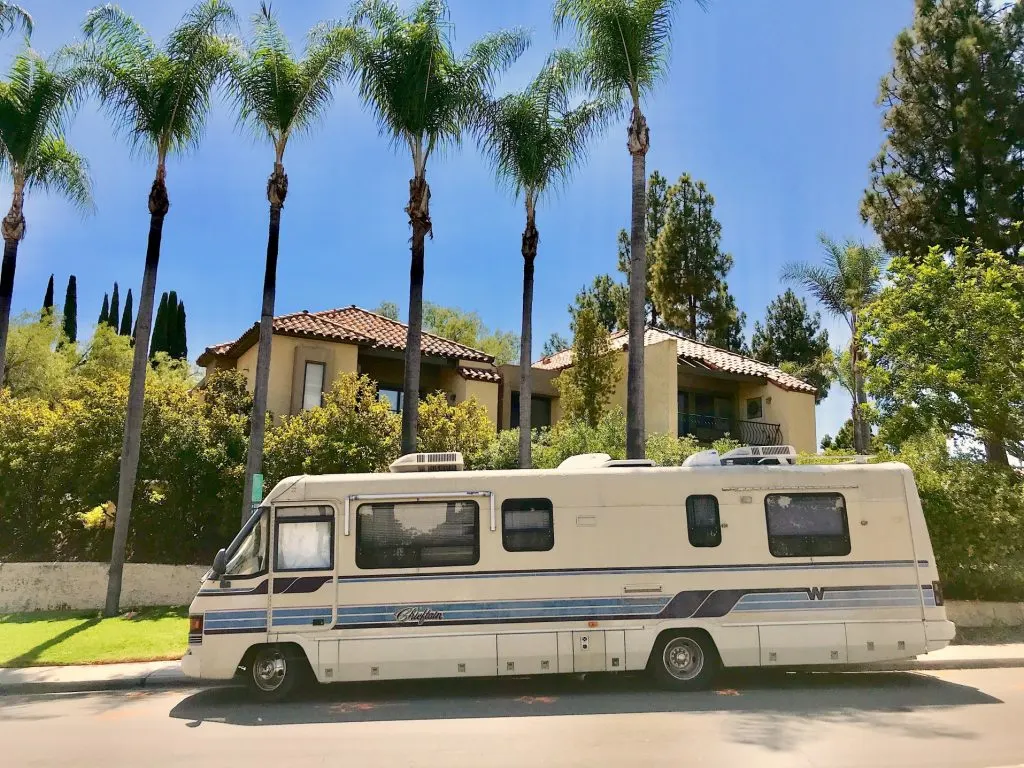
New vs. Used RVs
If you buy a new RV, you get a unit that no one has gotten their grimy hands on! A brand spanking new mattress, cushions, and bathroom will be all yours.
Of course, new units aren’t without problems, since many things don’t work right from the factory. But they are covered by a warranty.
In addition, financing is often handled at the dealership which makes things on that end easier when buying new.
However, a used trailer or RV is often a better economical choice.
Camille Attell, full-time RVer and founder of More Than a Wheelin’, bought a new RV. She came to realize later, a used RV purchase may have been more sound.
“I wish we had bought a used RV,” says Attell. “While we’re really happy with our RV and chose wisely, we could have saved a lot of money and even time by avoiding all the “breaking in” that you do when you buy new.”
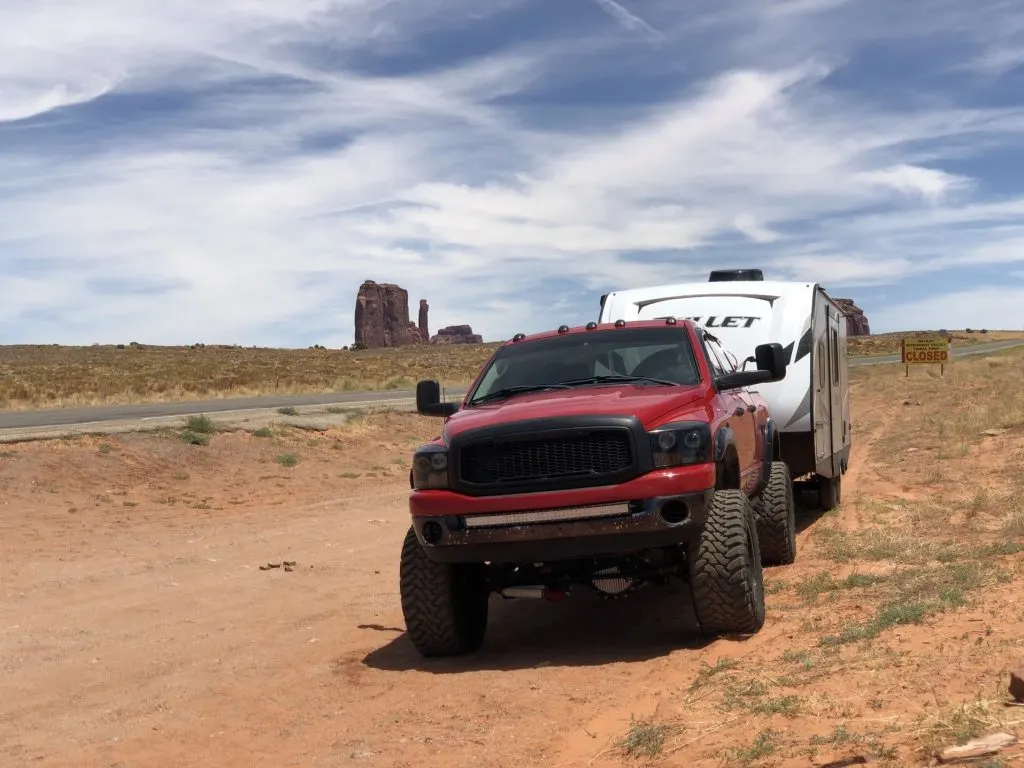
Attell had the chance to purchase the same RV but a year older and could’ve spent $15,000 less.
She says, “that was a tough lesson learned and one that we will definitely do differently next time.”
Benefits of Buying a Used RV
A used RV is cheaper than the same unit brand new.
Of course, it pays to do your research on brands so you are comparing apples to apples. Buying used takes the depreciation off of the RV and you don’t have to take the financial hit that comes with a new purchase.
A used trailer should already have the bugs worked out and fixed under warranty. The little annoying problems that squeak through quality control will hopefully already be discovered and taken care of by the owner.
Previously owned RVs may also have upgrades that were added by the seller.
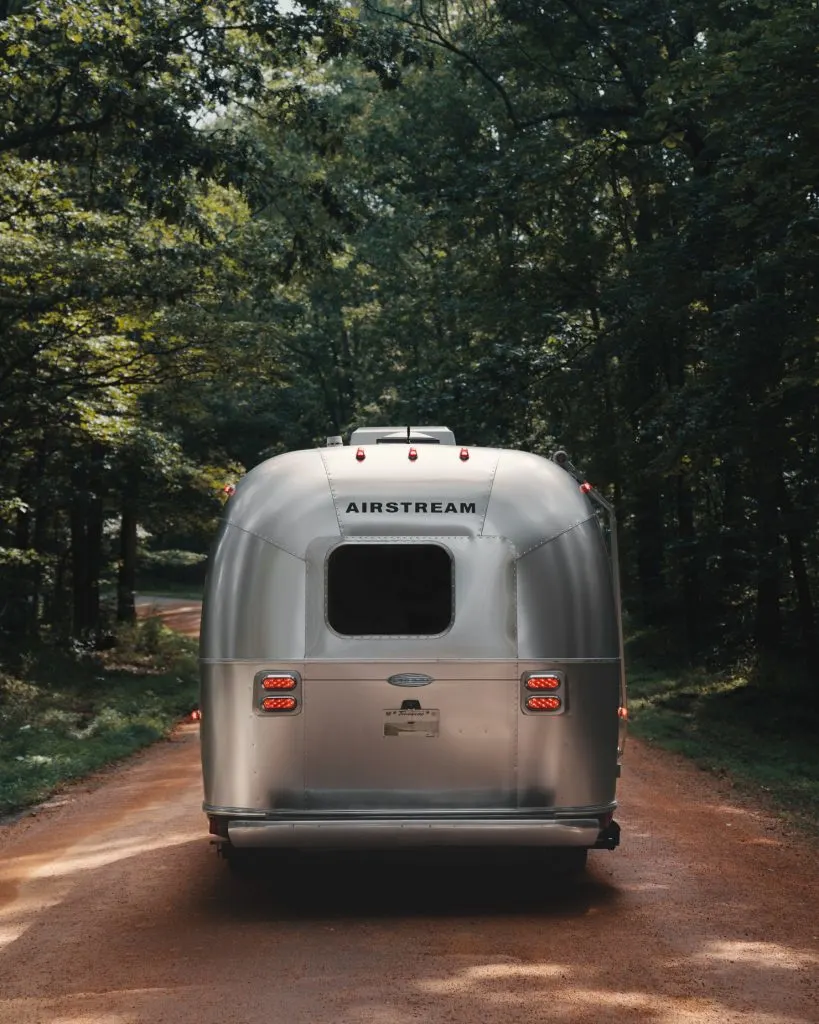
Some of these may not be to your liking, but electric jacks, fancy steps, cell boosters, solar systems, generators, bigger TVs, all of these may already be included in the deal. This saves you money and time with weekend projects.
If the previous RV owner is getting out of camping, they may even include dishes, hoses, cords, leveling jacks, and outdoor furniture with the deal as well!
That can add up to thousands of dollars saved from buying new where the expensive add-ons are upsold, or even worse you take your expensive rig home only to find out you can’t even plug it in without spending hundreds more dollars.
The research on these items has been taken care of, since the owner figured out what would make camping life easier with that particular unit.
Avoid High Pressure & Get Creative
Private sellers are also rarely high-pressure salesmen with the training to seduce you into things you may not want, so the used purchase may be less stressful.
Ashley Mann of RV Inspiration had the opportunity to get creative with negotiating because she bought a used RV from a private seller.
Mann says, “After contacting and negotiating with the seller, we worked out kind of a unique arrangement: we paid to have a washer/dryer combo unit installed in the RV by a trustworthy mechanic as a form of “earnest money” (which we paid for with a credit card, to protect ourselves), and in exchange, the owner actually traveled to us to deliver the RV.”
Since the purchase, Mann has been very saticisfied. She would even consider buying a slighlty older used RV next time.

“Our RV was still in great shape, and after we repainted the interior to update the style, we loved it inside and out…Next time I shop for an RV, I may even feel comfortable buying an even older RV knowing the condition ours was in when we sold it three years later and for $13k less than we paid for it.”
Cons of Buying a Used RV
There are also downfalls to buying a used RV. The units aren’t brand spanking new, so there is wear and tear. Some wear is to be expected, but often buyers are turned off by using a previous stranger’s mattresses or bathrooms.
Replacing items may be expensive. And of course, excessive wear and tear by previous owners reduces the value of the unit and may even be considerable repairs that need to be taken care of before you go camping.
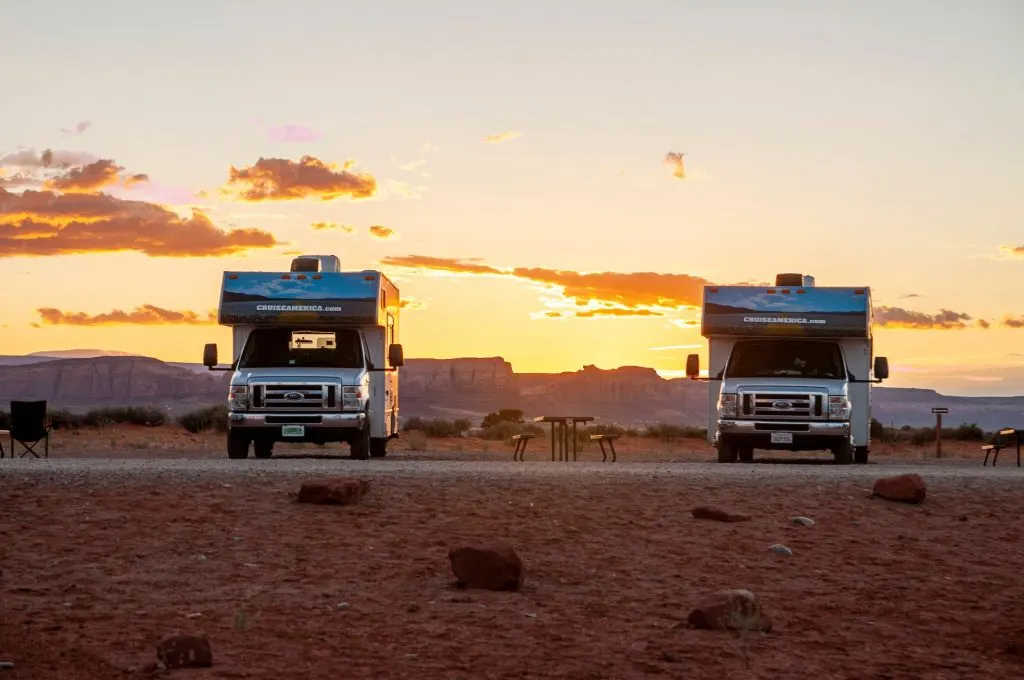
There may be hidden issues.
Jennifer Madsen has an eye for interior design – her site Tiny Tree Decor will inspire any used RV buyer. She recently purchased a 1980 Fleetwood motorhome and admits her excitement blinded her decision making at the time.
Madsen says, “Look everything over multiple times…we did not check the toilet. The lid was down and it looked okay. It was not okay. Not by a long shot. The previous owners left us with a cleanup job that would take down the best of us.”
Be very careful inspecting a used trailer from all angles, to make sure the tires, axles, undercarriage and frame are all straight and not bent or rusted through.

The welds should still be solid. If you don’t feel comfortable judging these items, bring a capable friend with you or hire an RV inspector to go through all the systems. Ask the owner to fire up the furnace, ac unit, fridge, water pump, etc. to check and make sure everything is in working order.
Warranty Concerns Loom
Another big drawback to a used trailer is that there is no factory warranty.
When a unit is new, the warranty covers most issues. With a used RV you will have to pay out of pocket. The only good thing about this is that you can get it repaired wherever you want, as you aren’t tied to a dealership anymore.
If you want to buy an extended warranty for your used RV, make sure you buy a unit that will qualify. This means you won’t want to buy an RV older than 10 years.
Repairs can be very costly, and finding a reputable or skilled RV repairman can be difficult.
We asked an RV mechanic which systems fail first. Here’s what he told us.
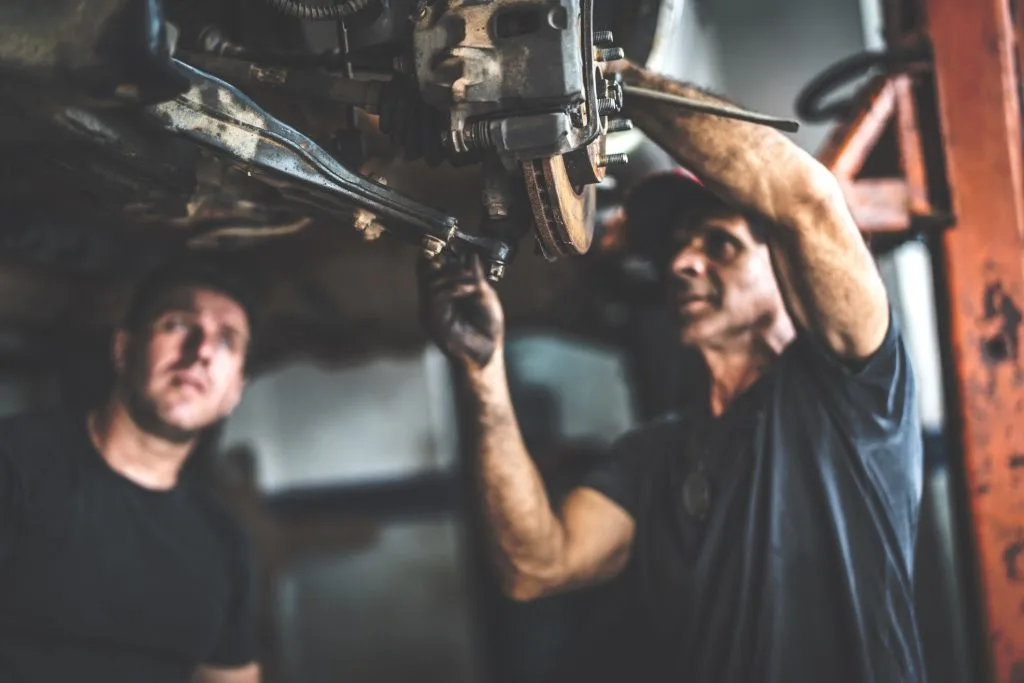
Should You Buy a Used RV?
If you are in the market for a new RV or travel trailer, considering a used unit is a great idea!
Lower pressure sales, the fun of the hunt, and finding more options are all bonuses. You can get a better deal and let the previous owner deal with the loss of depreciation.
Be careful of inspection to ensure that you are sure of any damage, repair, upgrades, or items that need attention on a used unit and how much those items will cost so that you can negotiate.
If you study the used marketplace and resale values, you’ll know if when you’re getting a good deal. Often in seasonal climates, you can get great deals at the end of the year as people don’t want to pay for storage.
Facebook marketplace, Craigslist, RVTrader, local RV storage lots, and even in some campgrounds are all alternative places to look for a used camper. RV Dealers often have used trade-in units but the deals likely won’t be as great as on the private market.
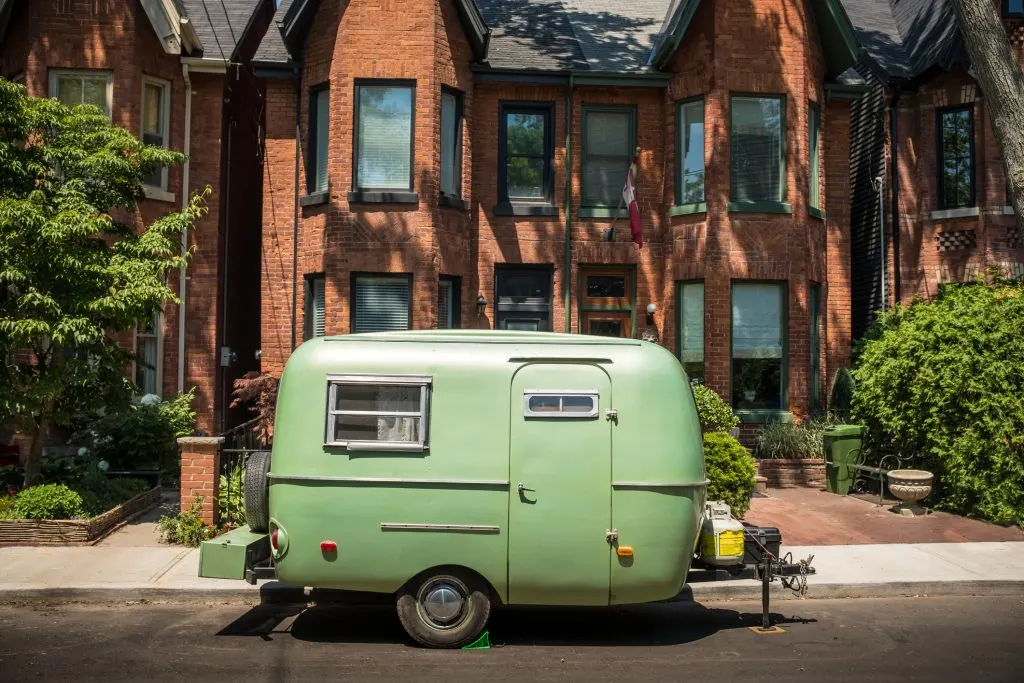
4 Tips for Buying a Used RV
Here are tips from used RV buyers. Take note, because these RVers have learned many lessons with their used RV purchase.
#1 RV Consumer Resource
Kelley Beasley, co-founder of Camp Addict says, “Become a member of the ‘RV Consumer Resource’. They rate RVs so you know ahead of time if you are getting something that is shoddy or was well-built.”
#2 Create An Inspection Checklist
“Buyers should do a very thorough inspection on their own before signing off on the rig. We had a list of 50+ items to check, ranging from engine oil to testing the toilet,” says Carol Guttery of Wayfaring Views.
“It’s time-consuming, but worth the effort. Sure, the dealer does a run-through, but our inspection revealed a leak on stovetop installation and missing bed boards, which the dealer fixed. “
#3 Don’t Be In A Rush
After buying a 40 year old RV, Jennifer Madsen adds this used RV buying tip.
“Don’t be in a rush. Be suspicious if the SELLER is in a rush. They should answer your questions thoroughly and be able to look you in the eye. The person we bought from got upset when I asked him if the roof leaked and said “no, of course not.” Well folks, the roof leaks.”
#4 Gut Instinct
Michael Lowe, CEO of Car Passionate, offers up a more instinctual piece of advice.
Lowe says, “I’d initially planned to look for a few days, but I found the perfect one after viewing only a few. If you get a gut-feeling, I’d say act on it. It’s worth it.”
Just remember, a gut-feeling can also tell you not to buy a certain RV!

What Do You Think?
Shopping for a used unit can save you a lot of money, get you included upgrades that you didn’t even know you needed, and have you camping quicker and cheaper than buying a new unit.
There are pros and cons to buying used, but it’s a great option to consider for your adventure home on wheels.
Please share your experience in the comments section!
Discover the Best Free Camping Across the USA
To be honest with you, we hate paying for camping. There are so many free campsites in America (with complete privacy).
You should give it a try!
As a matter of fact, these free campsites are yours. Every time you pay federal taxes, you’re contributing to these lands.
Become a FREE CAMPING INSIDER and join the 100,000 campers that love to score the best site!
We’ll send you the 50 Best Free Campsites in the USA (one per state). Access the list by submitting your email below:
We bought used twice. Upside was being able to pay cash – no debt was nice. Downside was the obvious. When an RV is 30 years old there will be weirdness. Some was ordinary wear like threadbare upholstery and was botched DIY by previous owners. Our most recent buy is a 1987 trailer with a bunk room with the most over-engineered and massive upper bunk we’ve ever seen. Definitely adds unnecessary weight and will be modified. Everything works, though, so when we paid only $1700 we figure we can’t complain much about odd stuff like a bunk that could support an elephant.
We just traded in our 2019 Flagstaff travel trailer for no other reason than we wanted one a bit larger. All I can say is, whom ever buys it will get a better than new coach for a huge savings. We did all those things a do it yourselfer does, when they think they are going to keep somthing forever! Stuff like, paint sealant, roof sealant, wax and more wax, re-enforcement of any panels, just because….insulating water pump to be quieter…better showerheads, sealing up any place that might be an air leak…and on the list goes. We had no warranty issues thank goodness, but if we had they would have been fixed for the next owners, keeping them from new coach ”bugs”.
Great article and helpful. We
are considering buying a used RV next year when the pandemic buyers decide to go back to hotels.
In 2015 we purchased a 2002 Class C with only 28,000 miles on it. We wanted an older unit to learn on. My husband three times backed up and damaged the rear of the unit, (even with a back up camera)! We sold the unit this past May because it didn’t have slides and we wanted more room. We were able to get a great deal on a demo at a dealership on a 2020. They reduced $12,000.00 because it had 4000 miles on it. We love our new unit. It has everything we wanted plus much more. We would highly recommend going with used first to learn on then if you like what you got, keep it, if not upgrade to newer.
Normally I’d say buy used: less than 10 years and good shape. Depreciation #1 reason. There are also problems with a new RV that are frustrating. I would consider 2 exceptions: Pleasure-Way has a 5-year warranty. There are also some dealers advertising “forever warranties.” Kyle, how about an article about “forever warranties?”
We bought a two year old travel trailer in 2017. I’m not sure how many miles it had been towed, but there were no visible problems. Paid about $8000 less than the same model brand new. In retrospect I think we could have gotten a lower price, but we were newbies in RV purchase. In the three years we’ve had the trailer we’ve towed it about 15000 miles, cross country and back plus some extended regional trips. There have been no major mechanical problems. I have done regular maintenance and replaced MANY screws and fasteners as panels start to come loose from frames, but considering how cheaply most RVs are constructed, I just figured this was a part of ownership. Being proactive definitely helps. If I were to buy another unit, I’d definitely look hard at used models-especially in about two years when the luster wears off all of the pandemic purchases being made.
Bought a 2010 travel trailer this year. It was in mint condition everywhere but a small corner of the floor under the slide. The used dealer covered up that part of the floor , which we later learned had water damage, and we were so swayed by the good condition of everything else that we didn’t notice. (Newbies) . The total cost of replacing the floor, which involves removing the slide, $3,000.00. While it was nice to have everything in such good condition, make sure you check the foundational things as well as those repairs are exspensive.